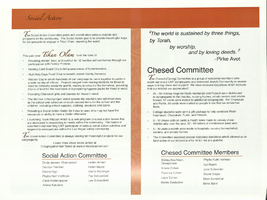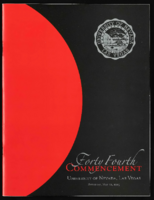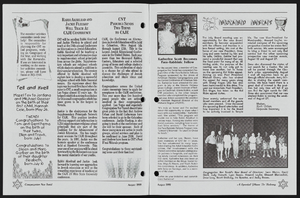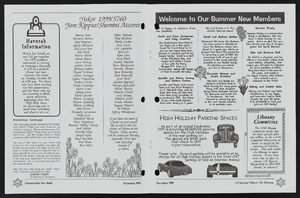Search the Special Collections and Archives Portal
Search Results

Annual report from Congregation Ner Tamid, 2011-2012
Date
Archival Collection
Description
Annual report from Congregation Ner Tamid, 2011-2012
Text

University of Nevada, Las Vegas (UNLV) 44th commencement program
Date
Archival Collection
Description
Commencement program from University of Nevada, Las Vegas Commencement Programs and Graduation Lists (UA-00115).
Text

Transcript of interview with Danny Lee by Claytee White and Stefani Evans, May 23, 2016
Date
Archival Collection
Description
Folks who graduated Boulder City High School in 1953 and who began kindergarten there might remember being in kindergarten class with Clark D. "Danny" Lee. They would be excused for not remembering the towheaded Lee; after all, he was in Boulder City only for the first half of the year. They also would be excused for not remembering Lee because he never stayed in school once he arrived. Danny was the child whose mother faithfully brought him to class every day. And every day, as soon as his mother dropped him off, he took off and beat his mother home. Danny Lee was born in his grandparents’ house in North Las Vegas, grew up on 10 Bonneville Street, and (except for his first semester of kindergarten in Boulder City) attended Fifth Street Elementary School and Las Vegas High School, where he graduated in 1953 with Rex Bell. In 1960 he married fellow Las Vegas High grad and former Rhythmette, Dorothy Damron; they have raised four children. Here, Lee talks about the difficulties his father had finding work and supporting a family during the Great Depression-of living with relatives and moving from place to place in the small travel trailer as his father found work. He describes a hardscrabble Las Vegas, where he and other kids in in multiethnic groups found temporary work helping drovers in the stockyards or filling blocks of ice in the icehouse. He recalls working for Superior Tire during high school and for the Union Pacific Railroad in a variety of jobs after graduation and the U.S. Army-including a stint as a Union Pacific tour director. v Lee’s early kindergarten career seems an unlikely academic indicator for a man who would spend most of his adult life volunteering for and lobbying on behalf of Clark County public libraries and who the American Library Association would select as the 1990 Library Trustee of the Year. Ironically, Lee was asked to serve on the Clark County Library District board of directors to get rid of a troublesome library director. Instead, he became one of the director’s staunchest advocates. It is appropriate that Danny and his wife, Dorothy, are pictured here surrounded by library books. The native Las Vegan built a lifetime career as a State Farm Insurance salesman, but in this interview he focuses on his public library advocacy, his time as trustee for the Clark County Library District; the formation of the Las Vegas-Clark County Library District; the ambitious building program funded by $80 million in voter-approved statewide bonds; and the political wrangling in Carson City necessary to achieve these ends. Lee’s oral history complements that of his wife, Dorothy Lee, and of Charles Hunsberger, who was the “troublesome” library director at the time Lee was trustee. Lee made his living as an insurance salesman. Lee’s ability to sell a product-whether it be insurance or an $80 million bond issue-is the attribute that made Danny Lee so valuable as a trustee to the Las Vegas-Clark County Library District and consequently, to all Clark County residents who value public library services. However, his passion, and dedication, and unbowed determination earned him the Library Trustee of the Year award. As Lee closes the interview, he locks eyes with Dorothy and muses, "Let me tell you what I'm most proud of in all . . . I've been married to this lady for fifty six years now. . . . I've lived a very blessed life. Being born in my grandmother's house and having lived in little travel trailers, it's just good. It's worked. We're living like we've always wanted to live right now."
Text

Transcript of interview with Alice Thiriot Waite by Carole Terry and Donna Andress, October 19, 2011
Date
Archival Collection
Description
The memories and recollections of Alice Thiriot Ballard Waite provide a most interesting look at both at the Junior League of Las Vegas in the 1970s and the early days of Las Vegas. Alice recalls her childhood and young adult years after she arrived in Las Vegas at the age of five, giving the reader a rare picture of Las Vegas in the 1950s and 1960s. She was most active in the volunteer community of Las Vegas and served as Junior League President in 1964-5. Her reminiscences about the events and activities during the years while she was a Junior League member are an invaluable insight into its history. The exhibits she is sharing are an important documentation of those years after the Service League became the Junior League. She herself was a forerunner of today's Active members because she was a single, working mother while serving as the first "professional" President of the League.
Text

Transcript of interview with Patsy Rosenberry by Barbara Tabach, February 24, 2013
Date
Archival Collection
Description
In the early summer of 1972, Patsy and Chuck Rosenberry packed the car to begin their journey from Hattiesburg, Mississippi to Las Vegas. Patsy’s two teenage children (plus a friend) crowded into the back seat as Chuck eased behind the wheel. He and Patsy had just recently married and he was taking his new family to their new home in southern Nevada. Chuck was a nuclear technologist at the Nevada Test Site and a kind, patient man that Patsy would have followed anywhere. As it turned out, Las Vegas was a wonderful fit and the family would thrive in their new hometown of Las Vegas. The children attended Valley High School; the family eventually bought into a house in the Paradise Valley area; and from 1978 to 1999 Patsy enjoyed working with a growing cardiovascular group. Chuck censored his work-talk like most Test Site employees, but Patsy recalls with pride his concern for safety and how he always felt the public did not have correct information. She also remembers the fun of partic
Text

Transcript of interview with Patricia Ross by Judy Harrell, March 19, 2014
Date
Archival Collection
Description
Patty Ann Drew’s life experiences capture large movements in Las Vegas history: mob-dominated gambling, the Helldorado Rodeo, explosive growth, medical advances, and Clark County School District’s Sixth Grade Centers—all in a desert city centered in the Mormon Culture Region. Patty arrived in Las Vegas as an infant with her parents and older brothers in 1944 and was raised in the Huntridge area, where she and her brothers attended John S. Park Elementary School and matriculated from there to Las Vegas High School. In this interview, Patty talks about her parents working on the Strip, her school days, joining the Church of Jesus Christ of Latter-day Saints, marrying her high school sweetheart, and becoming a young mother in Las Vegas. After Patty married her second husband, Thomas Ross, the couple built a house west of Jones Boulevard and Patty gave birth to her third son. In addition, she returned to school to earn her Bachelor’s and Master’s degrees and taught at C. H. Decker Elementary School for twenty years.
Text

Transcript of interview with Edward "Ed" Butera by Stefani Evans and Claytee White, July 28, 2016
Date
Archival Collection
Description
Engineer Edward "Ed" Butera spent hours constructing models from the time he was a five-year-old boy in San Jose, California. Besides his interest in building and design, the young Butera also loved math and music—specifically the clarinet, at which he excelled, and which he still enjoys. After earning his Bachelor’s degree in Electrical Engineering at San Jose State University he was hired by Ralph Joeckel as a consulting engineer for Trane, a heating and air conditioning company. Joeckel became a mentor and "second dad" to Butera after the company sent him to Las Vegas in 1972, and the two remain close to this day. In this interview, Butera shares how he engineered and designed power, water, sanitation, utilities, and heating and cooling systems on many Clark County high schools, hospitals, and data centers while considering such factors as the building's shape and its affect on the way wind forces act on its glass, windows, and doors. He talks of his casino work that began with the Stardust soon after he arrived in Las Vegas, and before his client list grew to include Tony Marnell, Steve Wynn, and MGM. Besides the hotels, he shares his experiences engineering the infrastructure for the Bellagio fountains, The Mirage volcano, Treasure Island's pirate show.
Text

Transcript of interview with Mark Hall-Patton by Claytee White and Stefani Evans, August 25, 2016
Date
Archival Collection
Description
Mark Hall-Patton, administrator of Clark County Museums and since 2008 a frequent guest on the popular cable television show Pawn Stars, was born in 1954 in San Diego, California. His mother was a registered nurse and his father served in the United States Navy. From early childhood, Mark’s interest in history and museums shaped his path in life. After graduating high school in Santa Ana, California, he earned his Bachelor’s degree in history at nearby University of California, Irvine. Degree in hand, Mark worked for Bowers Museum in Santa Ana and founded the Anaheim Museum in 1984. He moved to Las Vegas, Nevada in 1993 to create the Howard W. Cannon Aviation Museum in McCarran International Airport. By 2008, Mark had become administrator over all Clark County museums. In this interview, he explains the various ways his involvement with the popular Pawn Stars program has turned “the museum guy” into a brand, introduced production companies to the value of filming in Las Vegas, increased Clark County museum visits and donations, and raised popular awareness of the academic fields of history and museum studies.
Text


